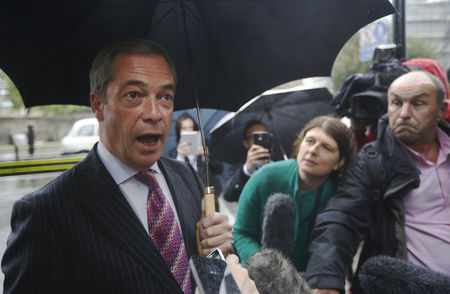By Alastair Macdonald
BRUSSELS (Reuters) - The UK Independence Party and Italy's 5-Star Movement formed an alliance in the European Parliament on Monday with a right-wing Polish libertarian in order to reconstitute a formal Eurosceptic bloc in the EU legislature.
Robert Jaroslaw Iwaszkiewicz is a member of the Congress of the New Right (KNP), whose leader has said women are too stupid to vote and doubts that Hitler knew of the Holocaust. His move makes up for the defection of a Latvian lawmaker last week that had triggered the formal dissolution of the Eurosceptic bloc.
The revival of the group gives it access to extra funding and the right to influential posts within the parliament.
"The Eurosceptics are now back with a bang," UKIP leader Nigel Farage said in a statement that renewed his denunciation of the parliamentary speaker and other "European federalists", whom he accused of "contemptible" tactics in shunning his Europe of Freedom and Direct Democracy (EFDD) group.
A spokesman for the EFDD said it had asked only Iwaszkiewicz to join it and not the other three KNP members in the chamber. These include party founder Janusz Korwin-Mikke, who was fined last month for using racist language during a debate and whose comments on women and the Holocaust have long caused outrage.
Farage's co-president of the EFDD, David Borrelli from the 5-Star Movement of Italian comic Beppe Grillo, noted that the addition of a Pole meant there would again be members from seven member states in the bloc, the minimum required for recognition.
Iwaszkiewicz, who told a newspaper in May that wife-beating could be useful, was quoted in the EFDD statement as saying he joined the bloc to help the "vital" Eurosceptic group in parliament, to oppose EU bureaucracy and support free markets.
The EFDD spokesman noted that Iwaszkiewicz had dismissed his reported remarks on domestic violence as "ironic" after he was quoted in an interview with Gazeta Wroclawska as saying: "It would help bring some wives back down to earth."
EUROSCEPTIC STRENGTH
After a surge in the Eurosceptic vote at EU-wide elections in May - a result of notably public disillusionment with rule from Brussels, immigration and unemployment - Farage and Grillo succeeded in forming the core of the voting bloc that also includes Swedish, French, Lithuanian and Czech members.
The diversity of views among Eurosceptics has complicated other efforts to unite them, however. UKIP refused a pact with France's National Front, which won a similar number of seats, citing a record of anti-Semitism among Front members.
Forming the EFDD brought additional funding and rights to senior posts on parliamentary committees, although Farage, who is riding high in British opinion polls, has since accused mainstream, pro-EU parties of denying the EFDD its due share.
Last week, UKIP accused speaker Martin Schulz, a German Social Democrat, of "blackmail" in pressing Latvian lawmaker Iveta Grigule to quit the EFDD in return for an official post. Schulz denied that. Grigule said she had been disappointed by the treatment of the EFDD by parliamentary authorities but also complained of the way the bloc was dominated by Farage and UKIP.

The party, which wants Britain to quit the EU, has 24 of the 48 members of the EFDD and 5-Star has 17. A spokesman for Schulz said on Monday that if the EFDD had a new member from a seventh country it would be able to be recognised as a voting bloc.
(Additional reporting by Christian Lowe and Wiktor Szary in Warsaw; Editing by Crispian Balmer)
